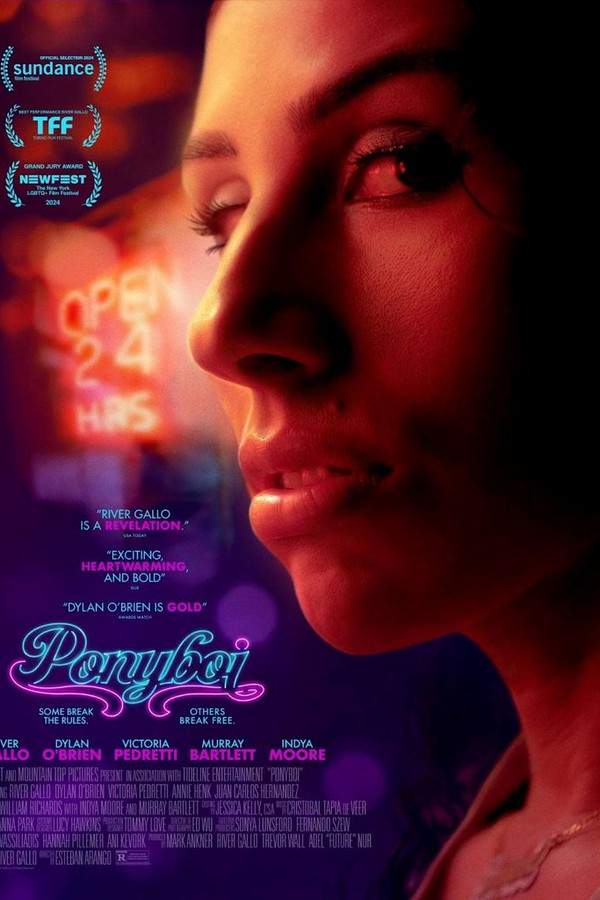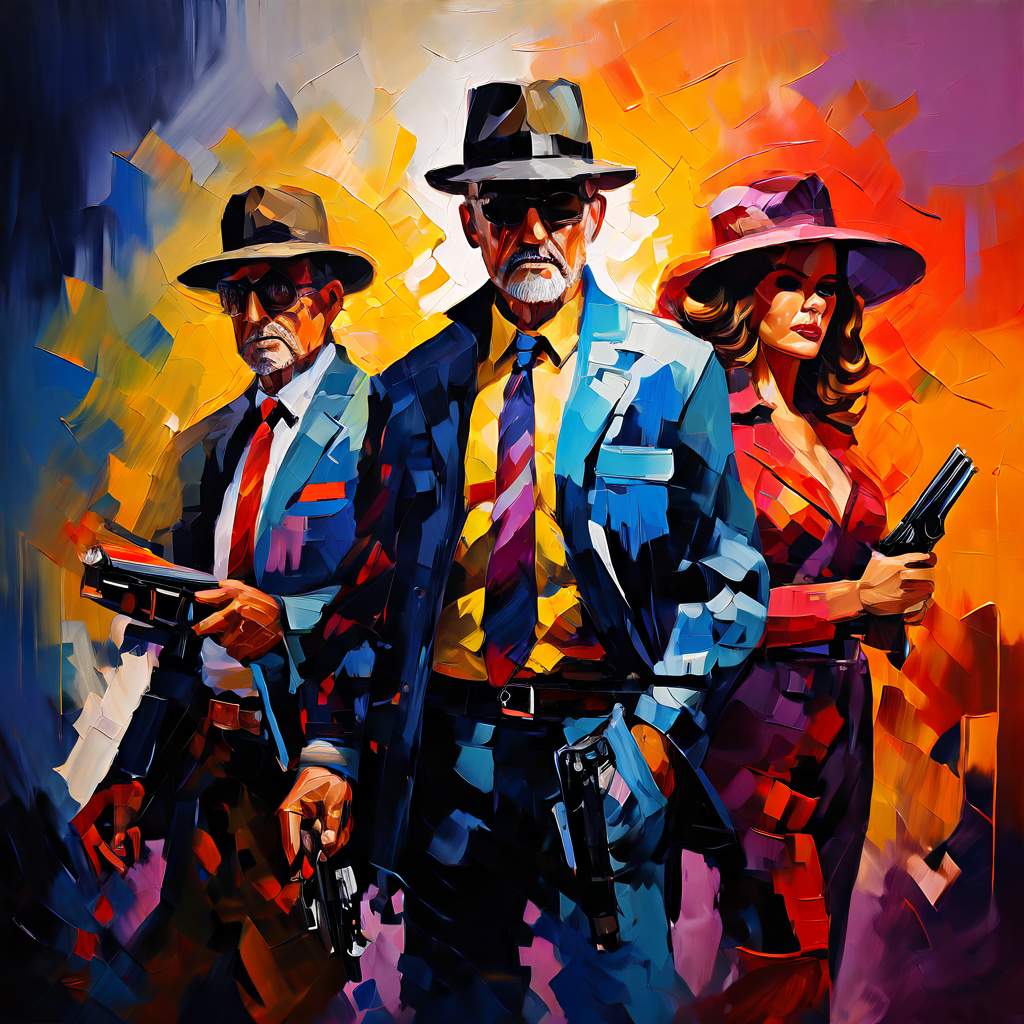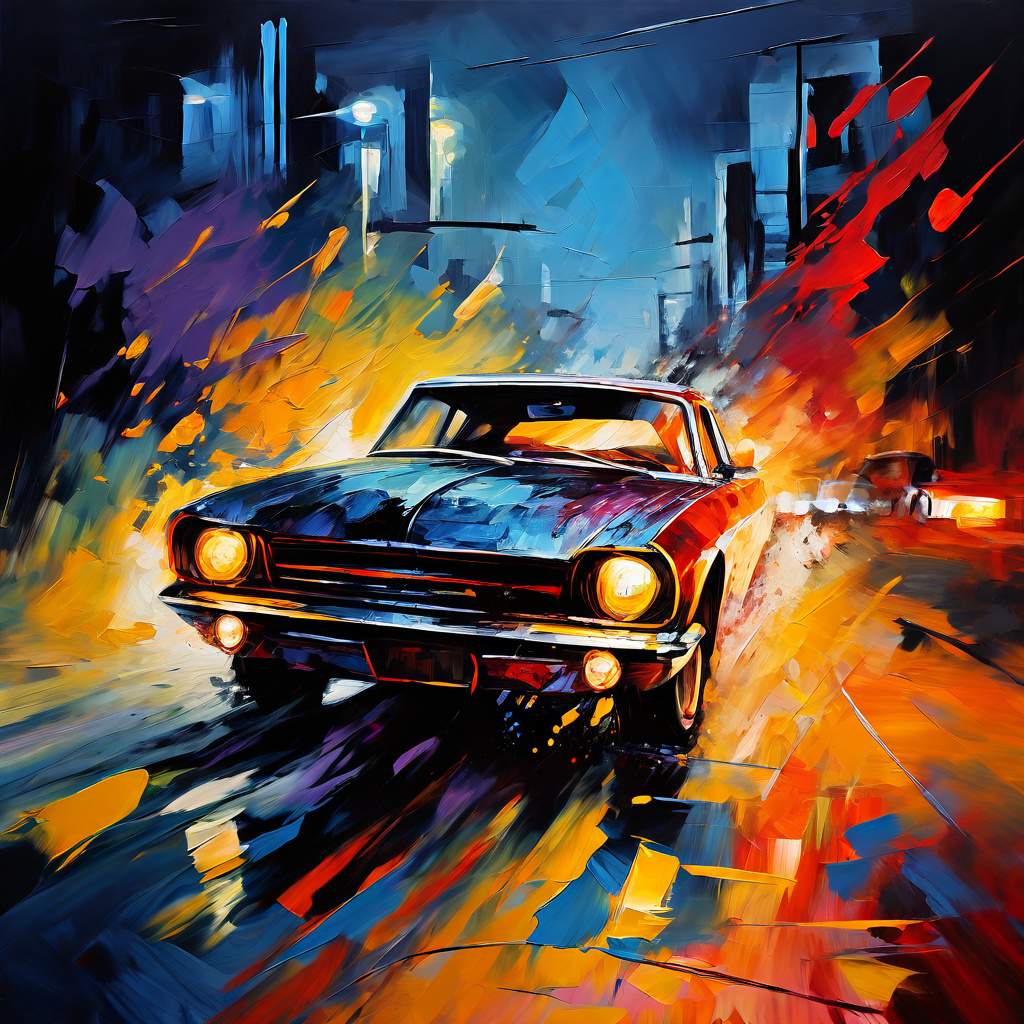What's After the Blog?
Reviews
Ponyboi (2025) Review: River Gallo Shines in a Dream-Soaked Jersey Crime Drama
Ponyboi is more than a Valentine’s-Day-gone-wrong thriller. We explore how River Gallo, Dylan O’Brien, and Murray Bartlett turn Esteban Arango’s neon-noir into a tender portrait of self-definition, intersex visibility, and Jersey grit—without skimping on pulpy mob thrills.
June 29, 2025

Movies mentioned in this article
Ponyboi (2025) Review: River Gallo Shines in a Dream-Soaked Jersey Crime Drama
Introduction
Every so often a film slips past genre expectations, applies a coat of glitter eyeliner, and commands our attention with fresh perspective. Ponyboi, director Esteban Arango’s feature-length expansion of River Gallo’s 2019 short, is that kind of cinematic surprise. While it borrows the neon shadows and moral ambiguity of classic neo-noir, the picture ultimately blossoms into a candid memoir about intersex identity, chosen family, and the ache of reinvention under New Jersey’s sodium-vapor glow. If you’re new here, welcome to the What’s After the Movie blog. A wealth of quizzes, cast facts, and additional resources await you on the film’s dedicated page.
Film Overview
Clocking in at 103 brisk minutes, Ponyboi follows its title character (played with magnetic vulnerability by writer River Gallo) across a single Valentine’s Day night in 2003. The supporting ensemble features Dylan O’Brien as Vinnie, a swaggering pimp whose cheap crystal-meth blend sets tragedy in motion; Victoria Pedretti as Angel, Vinnie’s pregnant girlfriend and Ponyboi’s confidante; and Murray Bartlett as Bruce, a gentle drifter in a cowboy hat whose quiet curiosity might be Ponyboi’s lifeline. Cinematographer Ed Wu paints New Jersey not in gritty realism but in bruised pinks and humid greens, while composer Cristobal Tapia de Veer laces doo-wop nostalgia beneath pulsating synths.
Narrative Synopsis
Ponyboi’s day job—servicing customers in the back room of a laundromat that doubles as Vinnie’s drug front—barely covers the cost of testosterone injections he relies on to maintain his sense of self. When an adulterated batch of “Proud Mary” meth kills a connected client in mid-spin cycle, two mob enforcers in flamboyant spats arrive demanding repayment. Ponyboi seizes cash from the register and bolts into the snow, hoping to reach Las Vegas for a fresh hormone stash and a clean slate. Bruce, a Mustang-driving stranger with Springsteen in his heart, offers a ride. Their nocturnal journey snakes through chrome diners, rainbow-streamered bars, and flashbacks of Ponyboi’s Salvadoran-Catholic childhood, layering trauma and longing against the backdrop of turn-of-the-millennium Jersey.
Performances
River Gallo’s portrayal is historic—one of the first times an openly intersex actor headlines a mainstream feature as an intersex protagonist—and the performance transcends that milestone. Instead of explanatory monologues, Gallo favors tangible gestures: the meticulous razor strokes over chest scars, the hopeful grin when Bruce asks about a favorite Springsteen song, the tremor of panic when a syringe shatters in a motel sink. Dylan O’Brien unpacks Vinnie’s petty bravado with surprising pathos, particularly during a breathless, off-key rap delivered in bed, where swagger collapses into shame. Victoria Pedretti anchors the film’s moral center as Angel, her leopard-print warmth a reminder that loyalty can exist even in exploitative spaces. Murray Bartlett’s Bruce embodies a mythic tenderness; each measured pause feels like permission for Ponyboi to exhale.
Visual and Aural Design
Rather than presenting New Jersey as interchangeable “East Coast grit,” Ed Wu captures a specific regional melancholy: fogged windows haloed by neon, wet asphalt reflecting turnpike signage, and diner fluorescents that seem to levitate patrons above their troubles. Tapia de Veer’s score deepens that sense of liminal yearning, slipping doo-wop croons beneath analog synth pulses so that nostalgia and anxiety coexist in a single chord. The aesthetic choices are not mere style exercises; they externalize Ponyboi’s inner clash of romantic fantasy and looming danger.
Thematic Focus
At its core, Ponyboi interrogates autonomy—medical, emotional, and narrative. The protagonist’s race toward hormone supplies reframes what might otherwise be a stock “bag-of-cash getaway” as a fight for bodily sovereignty. The film also deconstructs hyper-masculine genre tropes. Cowboys and mob bosses, familiar emblems of binary gender power, are repurposed to spotlight an identity forged in the gray area between prescribed roles. Finally, the story embodies Thomas Hardy’s notion that local specificity breeds universal resonance; by rooting every accent, diner jukebox, and boardwalk memory in real Jersey texture, Ponyboi communicates outsiderhood with remarkable clarity.
Narrative Shortcomings
The picture stumbles only when it leans too heavily on genre convention. A gunfight staged in crimson fog feels transplanted from a louder action film, while extended exchanges between mob heavies occasionally spell out stakes the visuals already convey. These hiccups never derail momentum, yet they briefly eclipse the intimate character study that makes Ponyboi distinctive.
Critical Reception
Early reviews suggest strong but measured enthusiasm: an upper-eighties approval rating on Rotten Tomatoes and generally favorable scores on Metacritic. Critics consistently laud Gallo’s breakthrough performance and Ed Wu’s kaleidoscopic cinematography, while a minority notes that the crime-plot scaffolding can feel familiar. Such reservations do little to blunt the consensus that Ponyboi represents a watershed moment for intersex visibility on screen.
Recommendation
Viewers seeking straight-ahead mob thrills may find the film’s reflective pauses and surreal flourishes unexpected. Yet for audiences drawn to genre remix, authentic regional atmosphere, and landmark representation, Ponyboi is essential 2025 cinema. The saturated palette deserves a theatrical canvas, where neon pinks and bruised greens pulse like a heartbeat across the screen.
Further Exploration
After watching, revisit the Ponyboi hub on What’s After the Movie for quizzes, cast biographies, and movie summaries. For comparative perspectives, Metacritic, Rotten Tomatoes, IMDb, TMDB, Wikipedia, JustWatch, Letterboxd, and Fandango each maintain updated pages on release schedules, box-office tallies, and audience reactions. Our site curates direct links so you can explore ratings, trivia, and streaming options without having to hunt them down.
Conclusion
Ponyboi occasionally grazes familiar crime beats, yet River Gallo’s fearless presence and Ed Wu’s incandescent visuals elevate every borrowed trope into something vividly personal. Under the pink Jersey neon, the film dares to ask how loudly a marginalized voice can resonate in a world designed to muffle difference. Its answer—glittering, wounded, defiantly sung off-key—secures Ponyboi a firm four-star place in the year’s cinematic landscape. Whether you leave the theater humming Springsteen or marveling at Gallo’s quiet strength, the film lingers like the hum of a late-night diner sign: fragile, electric, and impossible to ignore.
Continue reading

What's After the Movie?
Not sure whether to stay after the credits? Find out!
Explore Our Movie Platform
New Movie Releases (2026)
Famous Movie Actors
Top Film Production Studios
Movie Plot Summaries & Endings
Major Movie Awards & Winners
Best Concert Films & Music Documentaries
Movie Collections and Curated Lists
© 2026 What's After the Movie. All rights reserved.








